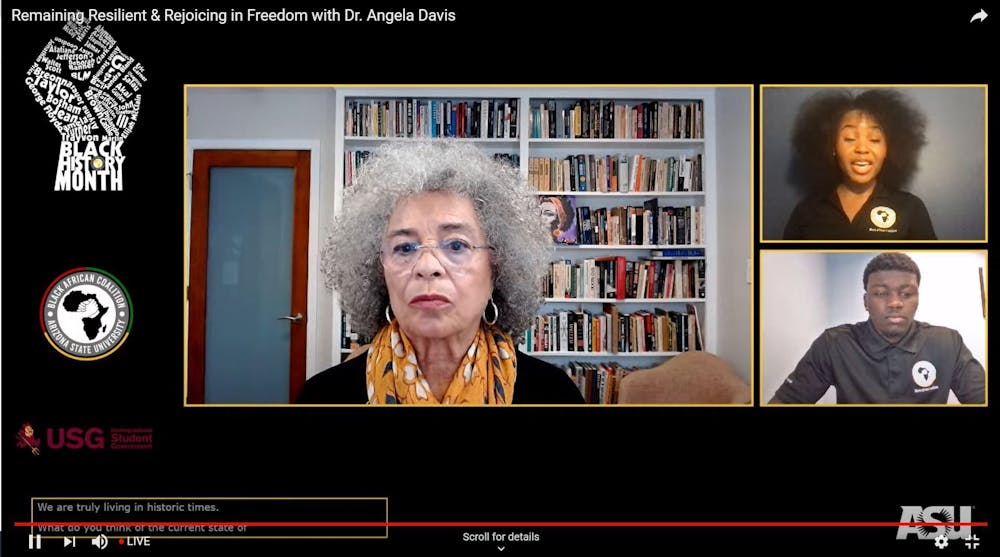Students sat down with renowned civil rights activist and scholar Angela Davis to discuss pressing issues affecting the Black community and the role students play in the greater movement toward racial justice.
The virtual panel discussion, hosted by the Black African Coalition and Undergraduate Student Government, focused on mass incarceration, police brutality and other displays of the racial inequity throughout history.
One of history’s most influential Black women, Davis set milestones during the height of the racial justice movement during the ‘60s and ‘70s and continues to do so today through her books and lectures across college campuses.
“I don't think I have been as hopeful as I am now, in many, many years, perhaps not since the 1960s,” Davis said. "I'm very hopeful, and I'm so glad that I get to experience this moment."
Then a member of the Black Panther Party, Davis witnessed firsthand the injustices against people of color that persist today and has dedicated her life's work to fighting systemic racism.
Fighting mass incarceration
A proponent of prison abolition, Davis said it is important to recognize the causes of mass incarceration in order to dismantle the current system disproportionately affecting people of color.
Over-policing and neglect of resources, such as housing and education, are among these many causes, Davis said. Real change, however, would come in the form of investment in mental health resources and the abolishment of the prison system, she said.
“The real change resides in the fact that we were able to pull apart the ideological veil that prevented people from understanding that there are human beings behind bars and that many of those human beings are beautiful people,” Davis said.
Aniyah Braveboy, president of the BAC and a senior studying public service and public policy, spoke on the dangers of complacency in activism.
"Our community has to remain resilient and continue that advocacy. Not only now, but in future years to come," Braveboy said.
The conversation shifted from issues affecting the Black community on a national level to the issues affecting Black students on the ASU campus.
Courtnee King, director of diversity and inclusion at USG Tempe and senior studying history and political science, said the University must prioritize access to the school’s resources for its Black community.
Using University Counseling Services as an example, King highlighted the need for “culturally competent” counselors who are reflective of the student population.
Black Lives Matter
Nearly a decade after the killing of 17-year-old Trayvon Martin, the fight against police brutality manifested through the Black Lives Matter is as powerful as ever.
Davis said she sees the same passion and rigor in the modern Black Lives Matter movement that she saw during the civil rights movement of the 60s.
George Floyd's death at the hands of police in May 2020 sparked protests worldwide, across the U.S. and even on campus.
"I'm getting tired of hearing the same recommendations over and over since I was a child. I can remember this, and nothing has changed," Davis said. "We have to think a bit more capaciously, slightly more radically, about what will be necessary to guarantee that we're not constantly seeing Black people and Latinx people and poor people whose lives are extinguished by the police. "
'I do not want reform'
The inequalities seen today are a result of the centuries of racism embedded into the country’s history, Davis said, and reform is no longer enough.
“I always have to say, I do not want reform,” Davis said. “The whole history of the prison system, the entire history of the police also, as a matter of fact, has been a history of reform. There have been efforts to create better prisons, better police ever since the introduction of these institutions.”
To think the establishment of the 13th amendment "was going to eradicate the influence of slavery and the patterns of racism that it enabled — that made no sense at all,” Davis said.
Though many of the same issues persist today, Davis said now is not the time to let up.
“One of the lessons we should impart to coming generations is that when your demands are fulfilled, don't sit back and think that you can rest. Always try to use those victories in order to stage more radical movements,” Davis said. “I think that there's an enormous amount of hope for young Black people, for young Black leaders.
“I don't think there's ever been any major transformation in this society without masses of people coming together and pressuring governments to change."
Reach the reporter at sreyes23@asu.edu and follow @r_salma_ on Twitter.
Like The State Press on Facebook and follow @statepress on Twitter.
Continue supporting student journalism and donate to The State Press today.




